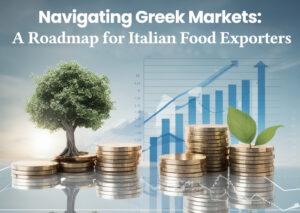The Mediterranean is more than just a region; it is a cultural and culinary melting pot with shared traditions that bind its people together. Italy and Greece are prime examples of this synergy, where the exchange of ideas, flavors, and goods has thrived for centuries. In recent years, this connection has extended to the commercial realm, with Italian food and beverage exports flourishing in Greece. The upcoming Italian food and beverage exhibition in Greece is a testament to this deep-rooted relationship, offering a platform for Italian businesses to further solidify their presence in a rapidly expanding market.
This article delves into the unique opportunities for Italian exporters in Greece, the driving factors behind the growth of Italian products in the Greek market, and strategies for success at the exhibition.
Cultural and Culinary Affinity: A Natural Partnership
Italy and Greece share a profound cultural connection, particularly in the realm of food. The Mediterranean diet, a UNESCO Intangible Cultural Heritage, is at the heart of both cuisines, emphasizing fresh ingredients, balanced nutrition, and a celebration of taste. This cultural alignment creates a fertile ground for Italian products to resonate with Greek consumers.
- Shared Mediterranean Heritage
Greek consumers are already familiar with many staples of Italian cuisine, such as pasta, olive oil, and wine. The similarity in culinary traditions makes it easier for Italian products to integrate into Greek households and restaurants. - A History of Trade
Italy and Greece have enjoyed strong trade relations for decades. Italy consistently ranks as one of Greece’s top trading partners, with food and beverages being a major component of this exchange. According to the Italian Trade Agency, Italian agri-food exports to Greece have grown significantly in recent years, driven by the demand for high-quality, authentic products.
Why Italian Products Thrive in Greece
Several factors contribute to the success of Italian products in the Greek market:
- Premium Quality and Authenticity
Greek consumers value quality and authenticity, attributes that Italian goods exemplify. Products with protected designations, such as Parmigiano-Reggiano, Prosciutto di Parma, and Chianti wine, enjoy strong demand due to their heritage and superior standards. - Versatility and Compatibility
Italian products seamlessly integrate into Greek cuisine. For example, Italian cheeses like mozzarella and ricotta complement Greek dishes, while Italian wines pair effortlessly with Mediterranean meals. - Tourism’s Role
Greece’s robust tourism sector has created a demand for imported premium goods. Italian products are particularly sought after in luxury hotels, gourmet restaurants, and cruise lines, where international tourists expect diverse, high-quality offerings. - Sustainability Trends
As Greek consumers become more conscious of sustainability, Italian exporters offering organic, eco-friendly, and ethically sourced products are finding a receptive market.
The Role of the Upcoming Exhibition
The Italian food and beverage exhibition in Greece is an unparalleled opportunity for exhibitors to showcase their products, connect with key stakeholders, and expand their reach in a lucrative market. Here’s how the event supports Italian businesses:
- Showcasing Innovation
The exhibition provides a platform for Italian exporters to highlight innovative products that cater to evolving consumer preferences, such as plant-based foods, gluten-free options, and organic goods. - B2B Networking Opportunities
Attendees include Greek distributors, retailers, restaurateurs, and hospitality professionals, offering exhibitors direct access to decision-makers in the industry. - Interactive Engagement
Live cooking demonstrations, wine tastings, and product samplings allow exhibitors to create memorable experiences for visitors, enhancing brand visibility and loyalty. - Regional and Global Reach
The exhibition attracts not only Greek buyers but also international participants, creating opportunities for expansion into broader markets, such as the Balkans and Southeastern Europe.
Strategies for Success at the Exhibition
To make the most of the event, Italian exhibitors should adopt the following strategies:
- Pre-Event Preparation
- Market Research: Understand Greek consumer preferences and tailor product offerings to meet local tastes.
- Marketing Campaigns: Use social media, email newsletters, and partnerships with Greek influencers to generate buzz before the exhibition.
- Engaging Booth Design
- Incorporate elements that reflect Italian heritage and craftsmanship, such as regional maps or imagery of production processes.
- Use interactive features like live cooking or pairing demonstrations to draw visitors.
- Bilingual Communication
- Ensure staff members can communicate in Greek and English to cater to a diverse audience.
- Provide brochures and product descriptions in multiple languages to enhance accessibility.
- Leverage Technology
- Use QR codes to direct visitors to digital catalogs, company websites, or promotional videos.
- Implement virtual reality or augmented reality experiences to showcase the origin of products, such as vineyards or cheese production facilities.
- Post-Event Follow-Up
- Send personalized follow-up emails to contacts made at the exhibition.
- Offer exclusive deals or discounts to Greek buyers to encourage long-term partnerships.
Opportunities Beyond the Exhibition
The exhibition serves as a gateway to broader opportunities in the Greek market and beyond:
- Expanding Distribution Channels
Establishing relationships with Greek retailers and wholesalers can open doors to other Mediterranean and Balkan markets. - Collaborations with Greek Brands
Partnering with Greek businesses to create co-branded products or events can enhance market visibility and credibility. - Leveraging Tourism for Export Growth
With Greece’s tourism sector rebounding strongly, Italian exporters can explore collaborations with hotels, cruise lines, and airlines to feature their products on menus and in gift shops.
The synergy between Italy and Greece is a celebration of shared heritage and mutual appreciation for quality and tradition. For Italian food and beverage exporters, Greece represents more than just a market; it is a partner in promoting Mediterranean excellence. The upcoming Italian food and beverage exhibition in Greece is an unmissable opportunity for exhibitors to build connections, showcase their products, and contribute to this thriving partnership.
With careful preparation, effective engagement, and a focus on long-term relationships, Italian businesses can not only thrive in Greece but also use it as a springboard for broader regional success. The stage is set, and the opportunities are endless—Italian exhibitors simply need to seize them.






